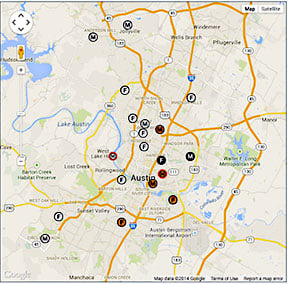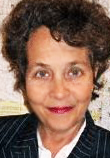Interactive maps show historic achievements afoot in 10-1 system of City Council representation
by Ken Martin
© The Austin Bulldog 2014
Posted Tuesday November 18, 2014 8:07pm

Suburban sprawl will overtake Austin City Hall when the new mayor and 10 City Council members are inaugurated January 6.
Other significant trends are that for the first time women are almost certain to outnumber men on the council; whites will still outnumber people of color but Hispanics will have more representation than ever, including the first-ever Latina; areas never before represented will finally have a seat on the dais; Republicans may gain a foothold; and the near-stranglehold on political power that the Westside has enjoyed for decades will be ended. (More about all these later.)
These are some of the trends evident in The Austin Bulldog’s 2014 interactive map of those already elected or engaged in a runoff as a result of the November 4, 2014, general election.

Linda Curtis, the Austinites for Geographic Representation sparkplug who led the volunteer petition drive that got the 10-1 plan on the ballot, said, “It’s obvious that we have accomplished with 10-1 the immediate goal, which was to have representatives in these districts. The real question is, ‘So what?’ Is business going to change? We’ll see.”
“What does it mean to have representation that’s still under the influence of the old political players—and to what extent that’s still in place will be seen when the new council takes seats in January,” Curtis said. “In politics it’s always about the future and what people actually do.”
Even before the runoff election of December 16 that decides who will be the mayor and who represents the seven council district seats not already filled in the November 4 election, it’s clear that the days when mostly central city residents will govern this city are over.
The outgoing six council members all live within a three-mile radius of City Hall, while the mayor is about four and a half miles from the dais. (See 2012 interactive map of the council that formed as a result of that year’s election.)
The winner of the District 6 runoff that decides who represents far northwest Austin will be some 13 miles from City Hall, as the grackle flies. The homestead of the District 8 runoff winner who represents the far southwest part of the city will be about 10 miles from the dais. If they weren’t already, these far-flung council members will become painfully aware of the traffic woes that other commuters experience daily.

“The geographic spread of this council across our city will be, by definition and design, more spatially dispersed than any other City Council in the history of the city,” said City Demographer Ryan Robinson.
West Austin dominance has ended
Perhaps the most significant of all the changes wrought by implementation of the 10-1 plan is the eviction of those parts of town that have wielded nearly total control over city government in the past. While the faces changed from time to time in past elections the most powerful base of local politics and the money that fuels campaigns has always been West Austin. When candidates of color were elected to the City Council they got there because Anglos cast the winning majority of votes in the at-large system, not because they were favored by minority voters.
In city elections held from 1971 through 2012 (see aggregate inactive map) a total of 121 seats were filled on the council (18 mayors and 103 council members). Fully 42 percent of those seats on the dais were won by candidates who lived in just two west and northwest Austin zip codes (78703 and 78731). They won 51 of the 121 positions that were up for grabs.
Of the 18 mayors elected since 1971, 16 lived in west and northwest Austin when elected (78703 and 78731). Will Wynn lived downtown in 78701 when reelected in 2006, although he too lived in west Austin’s 78703 when first elected mayor in 2003. Austin’s only Latino mayor, Gus Garcia, was the rare exception, as he lived in northeast Austin (78752).
Things are vastly different in this year’s election. The only west Austin council candidates who live in those long-dominant zip codes to survive the November 4 general election are District 10 opponents Mandy Dealey and Sheri Gallo. Both live in 78731.
Mayoral runoff candidate Steve Adler lives in west Austin’s 78746 while his rival Mike Martinez resides in east Austin’s 78702.
Demographer Robinson notes that if elected Adler will be the first mayor to live on the south side of the river. And he said if Martinez wins he will be the first mayor from the historic sections of east Austin.
South Austin gets representation
This city hasn’t had a council member who lived in South Austin since 2008, when Betty Dunkerley and Jennifer Kim left the dais. In fact, as a result of the 27 elections conducted 1971 through 2012, eight city councils that were formed included no one who lived south of Lady Bird Lake, where some 40 percent of the population resides.
That will no longer be the case. As a result of the 2014 elections the council will have a minimum of three council members living on the Southside—four if Susana Almanza manages to best her brother, Sabino Renteria, in the December 16 runoffs.
Republicans may gain seats
Sure, the mayoral and city council contests are technically nonpartisan, but don’t for a moment think that partisan political proclivities play no part. Democrats have dominated these positions for decades and, as reported by The Austin Bulldog August 13, 2014, the Travis County Democratic Party held school for and provided technical resources to council candidates who are Democrats.
The runoffs in Districts 6 and 8 offer the opportunity for Republicans Don Zimmerman and Ellen Troxclair, respectively, to break that headlock and win a council seat. Or for Democrats Jimmy Flannigan and Ed Scruggs to block the possible GOP icebreaker.
The District 10 runoff matches Sheri Gallo, who has voted in more GOP than Democratic primaries, against deep-blue Democrat Mandy Dealey.
The three council members already elected are Democrats, as are the rest of the candidates involved in runoffs.
Racial mix still the balance
The race of candidates already elected or engaged in the runoffs indicates that the city council will be composed of:
Whites—Six whites will represent Districts 5 through 10:
• District 5 Ann Kitchen
• District 6 Jimmy Flannigan or Don Zimmerman.
• District 7 Jeb Boyt or Leslie Pool.
• District 8 Ed Scruggs or Ellen Troxclair.
• District 9 Kathie Tovo.
• District 10 Mandy Dealey or Sheri Gallo.
Hispanics—Hispanics will represent Districts 2 and 3, with Delia Garza already elected to District 2, and District 3 pits siblings Almanza vs. Renteria.
African American—The District 1 runoff will decide whether Ora Houston or DeWayne Lofton serves on the council. Both are African Americans.
In play—The runoffs for mayor (Adler vs. Martinez) and District 4 (Greg Casar vs. Laura Pressley) will determine whether these two positions will be filled by whites or Hispanics.
Conclusions—Regardless of the runoff results the new council will have at least two Hispanics, something never achieved since the first, John Treviño Jr., was elected in 1975.
Given that the council will now have 11 members and only one African American, this represents a dilution of black political power. Since 1971, when Berl Handcox became the first African American elected, the council has always had one black member on the seven-member council.
Male or female mix in flux
Females— While women are once again locked out of the mayor’s contest, they need to win just two of the five runoffs to gain a female majority on the council. Three seats have already been won by women, including Delia Garza in District 2, Ann Kitchen in District 5, and Kathie Tovo in District 9. And the District 10 runoff between Mandy Dealey and Sheri Gallo will decide which of these two women serve.
Males—Only two of the 11 council positions will definitely be occupied by males. Those are mayor (Adler or Martinez) and District 6 (Flannigan or Zimmerman).
In play—Five runoffs will conclude whether the dais will be lopsidedly female or that males catch up:
• District 1 candidate Houston netted 49.12 percent of the votes on November 4, compared to just 14.41 percent for runner-up DeWayne Lofton, and seems likely to add to the ladies column, for the fifth female electee.
• District 3 siblings Almanza and Renteria were close in the general election with 20.99 percent to 18.80 percent, respectively.
• District 4 opponents Casar at 36.85 percent vs. Pressley’s 21.55 percent gives the male the advantage.
• District 7 opponents Boyt (16.89 percent) vs. Pool (32.14 percent) gives the ladies an edge, and the possible sixth female electee.
• District 8 features Troxclair (26.48 percent) vs. Scruggs (25.54 percent) nearly a dead heat. This race may be decided more on party lines, Republican Troxclair vs. Democrat Scruggs.
How long will 10-1 stand?
 Peck Young, the volunteer political consultant for Austinites for Geographic Representation whose strategy helped carry the 10-1 plan to victory in the November 2012 City Charter election, said these demographic shifts were inevitable.
Peck Young, the volunteer political consultant for Austinites for Geographic Representation whose strategy helped carry the 10-1 plan to victory in the November 2012 City Charter election, said these demographic shifts were inevitable.
“The point is we decided as a city we would have representatives from all parts of the community,” he said.
But he foresees a challenge to the 10-1 plan in the future.
“The insiders are not going to put up with the unwashed from other parts of town running city government. They will try to change it back to their elitist form of government. Mark my words it will happen,” he said.
“There is a history of rich, elite white people not wanting anyone else running the city. They won’t be satisfied with people in their circle not having a say in city government.”
Related Bulldog coverage:
Two Women Win Without Runoffs: Delia Garza Austin’s first Latina council member, former state representative Ann Kitchen also victorious, November 5, 2014
Candidates Rich and Poor Competing: Occupational income, investments, debts, real estate, business interests, and much more detailed in filings, September 30, 2014
Candidates Have Voting Records Too: Some vote often, some don’t vote much and one candidate isn’t a registered voter, August 29, 2014
City Elections Are Nonpartisan, Right? But that’s not stopping the Travis County Democratic Party from helping candidates, August 13, 2014
Steve Adler Land Developer: The mayoral candidate profited from not having to comply with the SOS Ordinance, August 5, 2014
Austin Governed By the Well-do-Do: November 2014 elections may deliver economic diversity in next city council, May 17, 2014
Steve Adler Wants to Be Mayor: He views the 10-1 system as a gift and an opportunity to restart, revitalize city government, April 23, 2014
City Spent $157,636 to Defend Council Violations: Payments for private lawyers for mayor, council members in criminal investigation, April 8, 2013
Background Investigation: Mike Martinez: Here’s what the public records say about the council member running for reelection, May 30, 2012
Maps Prove a Select Few Govern Austin: Forty years of election history expose extent of disparity, August 4, 2011
Mayor Pro Tem Mike Martinez Goes On the Record About Private Meetings: First in a series of recorded question-and-answer interviews, February 2, 2011
Open Meetings, Closed Minds: Private meetings to discuss public business shows Austin City Council may be violating Open Meetings Act, January 25, 2011







